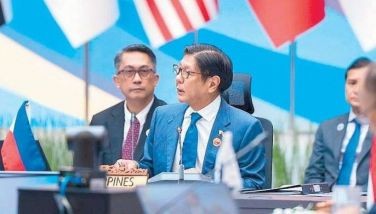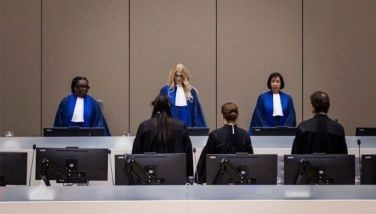Perceptions

November 8, 2006 | 12:00am
KARACHI – The news as I arrived in this Pakistani port city yesterday, apart from the US elections, was that an Al-Qaeda operative based in Britain had been sentenced after pleading guilty to plotting bomb attacks in London, Washington, New York and New Jersey.
Reports said Muslim convert Dhiren Barot’s plot to pack limousines with gas cylinders for the bombings was contained in a document bearing his signature that was found in Pakistan. He was reportedly inspired by the train bombing in Madrid and had gone to Pakistan to brief his "terrorist masters" about his plans.
With such news coming out about this country, I am not surprised that for only the second time in my many trips overseas, my mother has expressed concern for my safety while abroad. The first time was when I went to Afghanistan to observe the parliamentary elections last year.
Another worrywart suggested that I ask the Americans first what they thought of the security situation in Pakistan before coming to this country.
Such concerns were heightened following the eruption of violent protests triggered by the missile attack on a religious school or madrassah suspected to be a Qaeda training camp in the northwestern Pakistani town of Khar.
The five missiles, fired from military helicopters on Monday last week, killed 80 people. Protesters suspect that the attack was backed by the US Central Intelligence Agency.
With such developments, and with almost every terrorist attack or plot featuring suspects with links to Pakistan, this country has developed an image as a haven for terrorists.
Pakistani officials insist their country is getting a raw deal and is being inaccurately portrayed by the foreign media. Pakistan’s Ambassador to Manila Muhammad Naeem Khan told me to look beyond what CNN and BBC were presenting about his country.
The two cable news giants were reporting yesterday about Barot, a 34-year-old former Hindu from Kingsbury in northwest London, and mentioning his links to Pakistan. Lost in the chilling details of his plot was the fact that he was caught through cooperation among British, American and Pakistani intelligence.
That is another detail that Pakistani officials want to emphasize: that the government of Pervez Musharraf has in fact been tough on terrorism, cooperating with the international community to stamp out the terror threat. Musharraf’s crackdown on terror cells and their training camps here have made him the target of assassination plots by Islamic extremists.
Filipinos should be familiar with the Pakistanis’ feelings of frustration; our tourism and trade officials have to keep reassuring the world that conflict areas and villages suspected to be hosting training camps for Jemaah Islamiyah are far from Metro Manila, other urban centers and major tourist destinations in the Philippines.
In the past six years a new threat has changed the world, and that threat is everywhere, though greater in certain areas.
Among the areas where the threat is perceived to be higher are parts of Mindanao, and yes, Pakistan. The best that governments can do is to show their resolve in fighting the threat and address the roots of violent extremism.
Pakistani officials like to emphasize that their government, born of a coup d’etat and installed as a military dictatorship in October 1999, has promoted democracy in this country and has put Pakistan on the road to becoming a modern, prosperous nation.
See for yourself, Ambassador Khan told me.
My welcome to Pakistan was chewing gum offered to me by my seatmate on the plane from Dubai – a Pakistani who has taken Swiss citizenship.
Despite the friendly gesture and his Swiss home address, I could not stop myself from wondering if he might have terrorist links. No specific profile fits a soldier of terror.
The typical Filipino knows little about Pakistan. Khan said there are only from 600 to 700 Pakistanis living in the Philippines, among them the resident representative of the International Monetary Fund. Dubai is teeming with Filipinos; there are so many at the international airport it may have to shut down if all those Pinoys decided to go on vacation at the same time. But Pakistan is not a destination for our overseas workers. What the typical Filipino knows about this country are its links to terrorism and its long-running feud with India.
Jinnah International Airport here was busy at 5:30 a.m. yesterday, with long lines of arriving passengers, mostly men, at the immigration area. Their clothes reminded me of Afghanistan.
Ask the Americans about the security situation here? They will surely consider this port city paradise compared with Baghdad, or with the Afghan capital Kabul a year after the elections.
Afghanistan, which seemed to hold so much promise during the elections, has been backsliding in the past months, with the Taliban resurgent and the opium trade flourishing. And where the Taliban goes, al-Qaeda and Osama bin Laden himself may not be far behind.
This is another concern of the world: that Pakistani tribal communities in the north are providing sanctuary for al-Qaeda if not Bin Laden himself.
Kabul and Islamabad have been pointing accusing fingers at each other. Pakistan, which backed the Taliban in Afghanistan about a decade ago, insists that country continues to be the base of the fundamentalist movement that provided sanctuary to Bin Laden.
Afghan President Hamid Karzai, on the other hand, told Newsweek magazine a month ago that Taliban leader Mullah Omar "is, for sure" in Quetta in this country and that Musharraf knows it: "We have given him the GPS numbers of his house and the telephone number."
Khan earlier told me that his country had 80,000 troops stationed along its border with Afghanistan, most of them native to the northern area, and there was no way the world’s most wanted terrorist could be holed up there without locals – and Musharraf’s intelligence agents – getting wind of it.
Is Pakistan a victim of bad press? As in perceptions about the Philippines, the truth may lie somewhere in between. I’m here to take a closer look.
Reports said Muslim convert Dhiren Barot’s plot to pack limousines with gas cylinders for the bombings was contained in a document bearing his signature that was found in Pakistan. He was reportedly inspired by the train bombing in Madrid and had gone to Pakistan to brief his "terrorist masters" about his plans.

With such news coming out about this country, I am not surprised that for only the second time in my many trips overseas, my mother has expressed concern for my safety while abroad. The first time was when I went to Afghanistan to observe the parliamentary elections last year.
Another worrywart suggested that I ask the Americans first what they thought of the security situation in Pakistan before coming to this country.
Such concerns were heightened following the eruption of violent protests triggered by the missile attack on a religious school or madrassah suspected to be a Qaeda training camp in the northwestern Pakistani town of Khar.
The five missiles, fired from military helicopters on Monday last week, killed 80 people. Protesters suspect that the attack was backed by the US Central Intelligence Agency.
With such developments, and with almost every terrorist attack or plot featuring suspects with links to Pakistan, this country has developed an image as a haven for terrorists.
Pakistani officials insist their country is getting a raw deal and is being inaccurately portrayed by the foreign media. Pakistan’s Ambassador to Manila Muhammad Naeem Khan told me to look beyond what CNN and BBC were presenting about his country.
The two cable news giants were reporting yesterday about Barot, a 34-year-old former Hindu from Kingsbury in northwest London, and mentioning his links to Pakistan. Lost in the chilling details of his plot was the fact that he was caught through cooperation among British, American and Pakistani intelligence.
That is another detail that Pakistani officials want to emphasize: that the government of Pervez Musharraf has in fact been tough on terrorism, cooperating with the international community to stamp out the terror threat. Musharraf’s crackdown on terror cells and their training camps here have made him the target of assassination plots by Islamic extremists.
Filipinos should be familiar with the Pakistanis’ feelings of frustration; our tourism and trade officials have to keep reassuring the world that conflict areas and villages suspected to be hosting training camps for Jemaah Islamiyah are far from Metro Manila, other urban centers and major tourist destinations in the Philippines.
In the past six years a new threat has changed the world, and that threat is everywhere, though greater in certain areas.
Among the areas where the threat is perceived to be higher are parts of Mindanao, and yes, Pakistan. The best that governments can do is to show their resolve in fighting the threat and address the roots of violent extremism.
Pakistani officials like to emphasize that their government, born of a coup d’etat and installed as a military dictatorship in October 1999, has promoted democracy in this country and has put Pakistan on the road to becoming a modern, prosperous nation.
See for yourself, Ambassador Khan told me.
Despite the friendly gesture and his Swiss home address, I could not stop myself from wondering if he might have terrorist links. No specific profile fits a soldier of terror.
The typical Filipino knows little about Pakistan. Khan said there are only from 600 to 700 Pakistanis living in the Philippines, among them the resident representative of the International Monetary Fund. Dubai is teeming with Filipinos; there are so many at the international airport it may have to shut down if all those Pinoys decided to go on vacation at the same time. But Pakistan is not a destination for our overseas workers. What the typical Filipino knows about this country are its links to terrorism and its long-running feud with India.
Jinnah International Airport here was busy at 5:30 a.m. yesterday, with long lines of arriving passengers, mostly men, at the immigration area. Their clothes reminded me of Afghanistan.
Ask the Americans about the security situation here? They will surely consider this port city paradise compared with Baghdad, or with the Afghan capital Kabul a year after the elections.
Afghanistan, which seemed to hold so much promise during the elections, has been backsliding in the past months, with the Taliban resurgent and the opium trade flourishing. And where the Taliban goes, al-Qaeda and Osama bin Laden himself may not be far behind.
This is another concern of the world: that Pakistani tribal communities in the north are providing sanctuary for al-Qaeda if not Bin Laden himself.
Kabul and Islamabad have been pointing accusing fingers at each other. Pakistan, which backed the Taliban in Afghanistan about a decade ago, insists that country continues to be the base of the fundamentalist movement that provided sanctuary to Bin Laden.
Afghan President Hamid Karzai, on the other hand, told Newsweek magazine a month ago that Taliban leader Mullah Omar "is, for sure" in Quetta in this country and that Musharraf knows it: "We have given him the GPS numbers of his house and the telephone number."
Khan earlier told me that his country had 80,000 troops stationed along its border with Afghanistan, most of them native to the northern area, and there was no way the world’s most wanted terrorist could be holed up there without locals – and Musharraf’s intelligence agents – getting wind of it.
Is Pakistan a victim of bad press? As in perceptions about the Philippines, the truth may lie somewhere in between. I’m here to take a closer look.
BrandSpace Articles
<
>
- Latest
- Trending
Trending
Latest
Trending
Latest
Recommended

May 27, 2025 - 12:00am





























